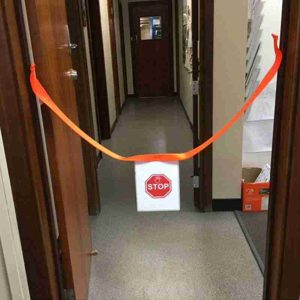What would you like to order?
Simply select the products you would like and proceed to the checkout. Ordering has never been so easy!

- 1300 90 44 11
Simply select the products you would like and proceed to the checkout. Ordering has never been so easy!

The Doorway Webbing Barrier is made from a bright orange webbing. It is designed to be a visual reminder for residents not to pass.
Another product to consider is the Doorway Floor Strips.
Sometimes a patient will walk down a corridor and enter another person’s room without an invitation. If the door is kept closed it is difficult for the staff to keep an eye on the person in the room, so it is necessary to leave the door open. The occupant of the room should have some privacy without other people wandering into their room, so the Doorway Webbing Barrier is a safe way to indicate the wanderer should not enter.
The advantage of the Doorway Webbing Barrier is that the Hook & Loop tape will easily detach if a patient walks into it or if they fall on it, the webbing should not cause any injury, compared to a metal or plastic chain.
The wandering patient may need to be told not to remove the Doorway Webbing Barrier, and hopefully they will remember and respect other people’s privacy.
Remove the backing paper from the Loop Dots, and fit to each side of the door frame. Fit at about shoulder height. Then attach the Hook Tape on the orange webbing.
The maximum usable length will be approximately 120cm / 47″. When using on narrower doorways, the Loop Dots that are stuck to the doorway can go higher up. This means the webbing loops down to waist level. By putting twists in the webbing it will be more noticeable to some residents.
It is important to tell staff that this item is to allow residents to have privacy in their rooms. It is not to restrict them from leaving a room, as then it could be considered to be a restraint, so restraint authorisation will be needed.
The Doorway Webbing Barrier may be useful for a variety of areas:
| Weight | 0.2 kg |
|---|
Copyright © 2024 all rights reserved
Designed by CareCreative
 Doorway Webbing Barrier
Doorway Webbing Barrier